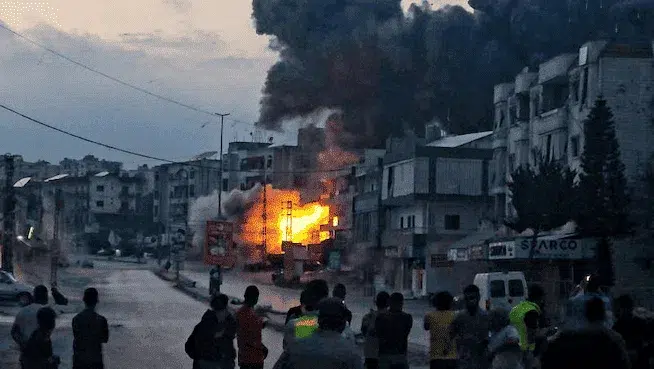The Lebanese front is witnessing a military escalation as Israeli airstrikes continue to hit areas in the south and east, even reaching the southern suburbs of Beirut. These strikes repeatedly target areas believed to host secret Hezbollah sites, including ammunition and missile depots. The resulting explosions hurl shrapnel and projectiles into nearby neighborhoods, spreading fear among residents and exposing the fragility of the ceasefire declared months ago.
Despite the escalation, Hezbollah remains militarily silent, merely absorbing the blows without direct retaliation—except for expressing condemnation through the media. Meanwhile, its members are being killed individually in scattered locations, either on motorcycles or in vehicles presumed to be safe. The Israeli raids are also targeting excavation machinery, construction sites, and prefabricated homes in border villages, as Israel accuses Hezbollah of building new military outposts under the guise of civilian home reconstruction.
In contrast, the Lebanese army, in cooperation with the Quintet Committee led by the United States, continues to conduct raids on Hezbollah weapons depots south of the Litani River as part of the implementation of UN Security Council Resolution 1701.
However, the situation is markedly different north of the river, where the army faces significant obstacles—chief among them Hezbollah’s refusal to allow raids on its positions, particularly in areas under its direct control such as Iqlim al-Tuffah, some villages in the Nabatieh Governorate, the western and northern Bekaa, and the southern suburbs of Beirut.
Lebanon’s delay in disarming Hezbollah puts the ceasefire agreement under daily stress, marked by “surgical” Israeli strikes. While the Lebanese government officially denounces the attacks, it avoids answering why it is unable to implement the agreement that ended the war—an agreement which led to the election of a president and the formation of a government that pledged to reform the country, fight corruption, and eliminate militia weapons from Lebanese territory, according to the presidential oath.
Amid the increasing Israeli strikes, Hezbollah has taken steps that harken back to the days before the war in southern villages. It has opened confrontations with UN peacekeeping forces (UNIFIL) in areas south of the Litani, where patrols face harassment by Hezbollah-aligned civilians, disguised as “locals.” These confrontations sometimes escalate to protests, road blockades, and attacks on UN peacekeepers, all occurring amid the Lebanese army’s ineffective coordination—even though Resolution 1701 grants UNIFIL the authority to freely operate and conduct raids in its areas of deployment in search of weapons.
International sources report that Israel recently warned about the Lebanese army’s leniency regarding Hezbollah’s arms depots north of the Litani River. A leniency which persists despite repeated alerts from the Quintet Committee, which emphasized the need to evacuate any suspected sites, especially given Israel’s assertions of the presence of weapons and ammunition—such as those discovered Thursday night in the town of Toul near Nabatieh, in Iqlim al-Tuffah, and in the village of Touline in the Tyre District.
Sources fear that the “leniency” stems from high-level decisions aimed at avoiding clashes with Hezbollah during the sensitive period of U.S.-Iran negotiations, paralleled by escalating Israeli threats. Beirut is reportedly opting to prevent the fallout of these talks from exploding into internal warfare on Lebanese soil.
Sources note that Hezbollah is adopting new methods to smuggle funds and sophisticated weapons, using advanced techniques via sea and air, preparing for another confrontation if necessary—particularly amid Israeli threats against Iranian nuclear sites.
Interestingly, sources add that while the Beirut government is striving to curb smuggling, “stronger” forces within the state are preventing effective action.
Sources, also, affirm that the ceasefire agreement technically allows Israel to carry out such attacks, as it had anticipated that Hezbollah—and by extension Iran—would not comply with its terms. Consequently, Israel has refrained from returning its civilians to its north, fearing that the next war was inevitable.

